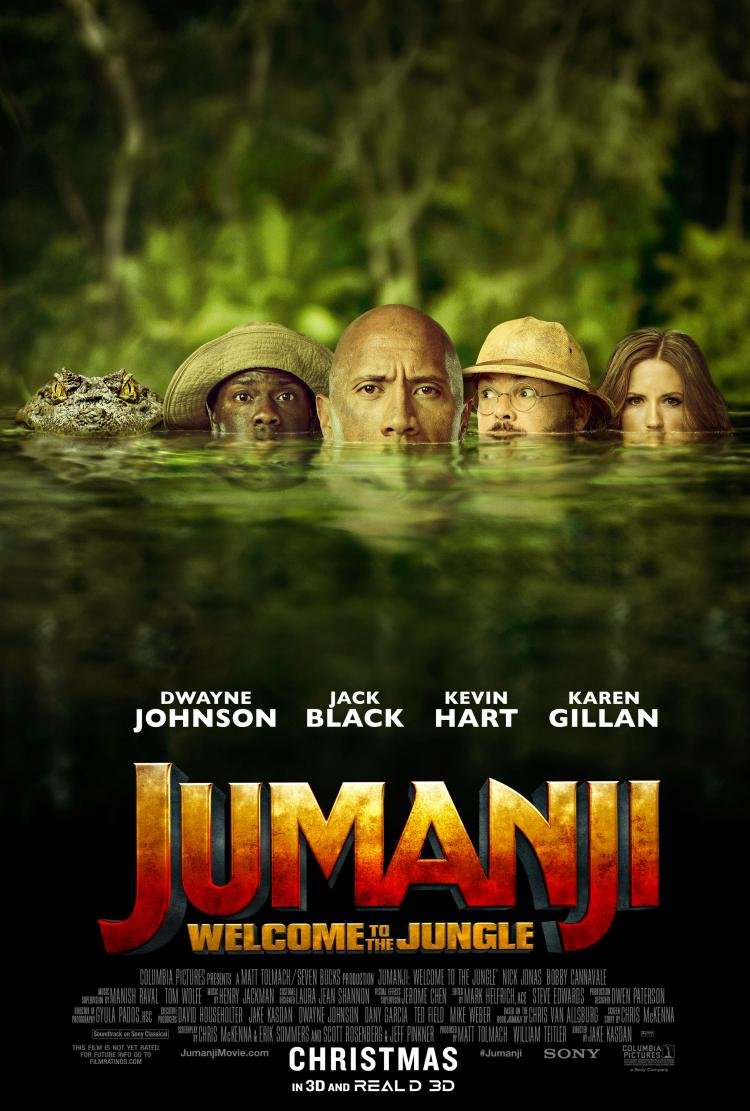With both me and my boyfriend getting sick, on top of a somewhat busy January, there haven’t really been many opportunities for us to go to the movies. I was a little shocked when I realized the last time we went to the movies together was in December for The Shape of Water. But this weekend we finally managed to get out and see a film (in AVX, of course) that has been on our list for the past couple of months, and one that friends and family have been recommending for quite some time: Jumanji: Welcome to the Jungle.

There’s always a concern with film remakes and reboots – you’re going into these kinds of films with an opinion and memories about the original, and then typically there’s the added bias of “this will never be as good as the original”. And yes, with a childhood classic like Jumanji that concern certainly creeps in. But luckily this film does not try to compete with the original. Although Welcome to the Jungle references the original Jumanji at various points throughout the film, this particular adventure is more of a comedy than a family film. Jake Kasdan’s work uses the previous film as a jumping off point, but takes the story of a terrifying jungle game in a new direction.
The classic board game gets a more modern update when Spencer (Alex Wolff), Fridge (Ser’Darius Blain), Bethany (Madison Iseman), and Martha (Morgan Turner) get sucked into Jumanji in the form of a video game and are replaced by avatars with interesting skill sets and peculiar weaknesses. As the bulk of the action takes place inside of a video game, the storyline has a particular kind of video game simplicity that is amplified for comedic effect. Non-playable characters like Nigel (Rhys Darby) are merely comedic, one dimensional plot devices; the villain, Van Pelt (Bobby Cannavale), has a predictable back story and no character development. In any other film this would be boring, but in this over simplified video game world these kinds of characters fit right in.
One nice little touch about this video game world is a nod to the original. In Jumanji, the children eventually team up with an older player who became trapped in the game as a child and grew to adulthood in the game world. This too occurs in Welcome to the Jungle when the teenagers meet up with an avatar in the form of Nick Jonas, who represents Alex: a teen who became trapped in the game over 20 years ago (and it was a pleasant surprise to see that his adult self is played by Collin Hanks). Not only does this parallel this key component of the original film, but Alex has been living in the same hut as Alan Parrish (Robin Williams) from the first film.
The adult avatars of the teenagers are the true stand outs of this film, and although they embody a bit of this video game oversimplification, they are the only characters to exhibit any real development – even if a lot of it is merely played for comedic effect. Keven Hart essentially plays himself in this film and although that’s not necessarily a bad thing for the comedic moments, there isn’t much of a link between him and the younger version of Fridge. Dwayne Johnson not only does well as the “smouldering” hero of the story, but he also does a decent job at embodying the quirks of young Spencer. Jack Black could easily be playing any generic and stereotypical teenage girl, so there is only a basic link between him and Bethany, but having Jack Black in this role is beyond perfect. He is easily the funniest part of the entire film. I found it was Karen Gillan, however, that did the best job at embodying the younger version of Martha (and no, I am not speaking as a biased Whovian). Both in her speech and movements she managed to capture a lot of the essence of Martha and embodied her younger self better than the other adult avatars.
At the core of this film are a lot of stereotypes. A lot. All of the teenagers represented a specific “type”: nerdy boy, overly studious girl, jock, popular girl. And on top of this, the avatars they end up becoming in Jumanji are not only made up of a different set of stereotypes, but conflict in some way with the stereotype of the teenager they are matched with. And this is all done in a rather predictable way (i.e. the nerdy boy suddenly becomes the muscular and handsome hero of the story). At times, it looked as if these stereotypes were being critiqued – like pointing out that the only woman on the team is not appropriately dressed for the situation, or that the black man of the group is the valet – but for the most part it looked as if these stereotypes were merely being used for laughs.
Underneath all of this a rather predictable moral presented by Principal Bentley (Marc Evan Jackson): you only have one life to live, so you have to decide what kind of person you will be. This is the principle message of the film (pardon the pun – I couldn’t resist). This comes in at many levels as the teenagers have all made poor choices and must learn from their mistakes, they have to chose whether to be like their old selves or their new avatar selves by the end of the film, and they are given limited lives within the game. This message appears to be a little heavy handed at times but it is absolutely appropriate for the way the story has been set up.
Most importantly, this film is hilarious. I quite literally laughed out loud for quite a bit of the film (especially when Jack Black was involved). Despite the predictability, simplicity, heavy handed messages, and stereotypes this film is a whole lot of fun. It does not try to be the original film, or to surpass it – this is a film that is aware of what it is. It is a comedic sequel/reboot where the most important thing is that audiences laugh and have a good time. The film doesn’t seem to take itself too seriously and it plays up the laughs where it can. Overall it was better than I expected and I would definitely watch it again.



